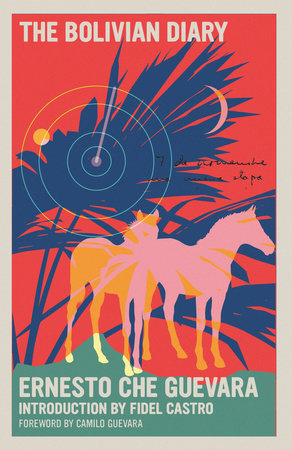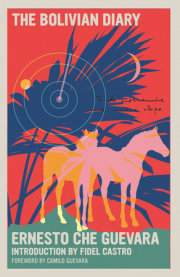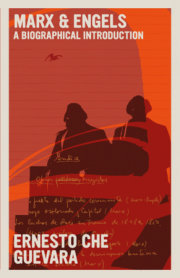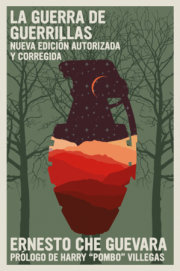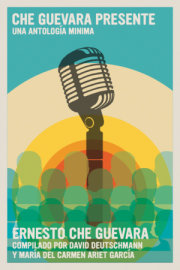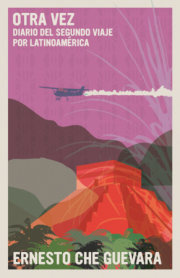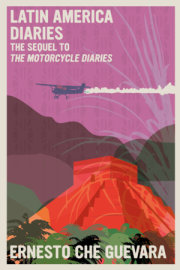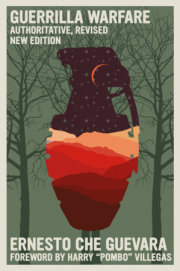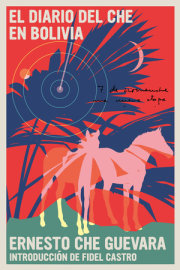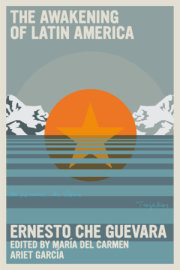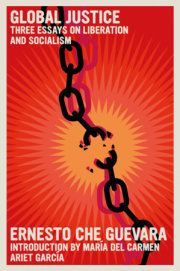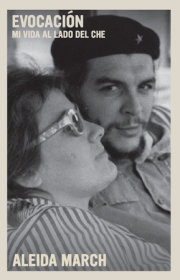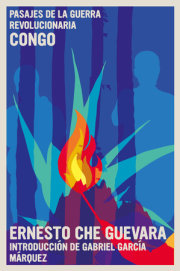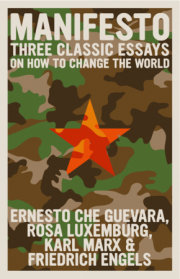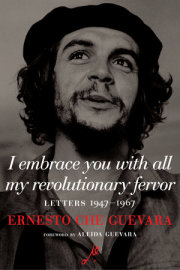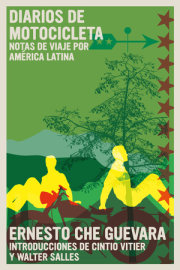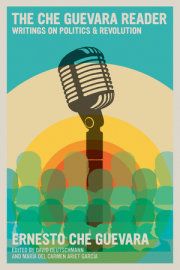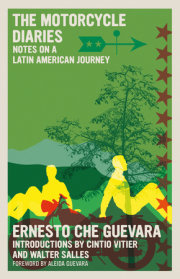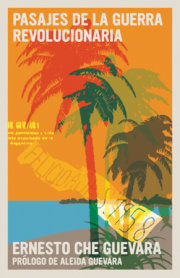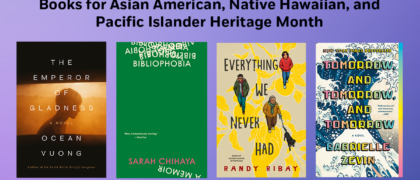A NECESSARY INTRODUCTION
Fidel Castro
It was Che’s custom during his days as a guerrilla [during the 1956–58 Cuban revolutionary war] to carefully record his daily observations in a personal diary. During long marches over rugged and difficult terrain, in the midst of damp woods, when the lines of men, always hunched over from the weight of their packs, ammunition, and weapons, would stop for a moment to rest, or when the column would receive orders to halt and set up camp at the end of an exhausting day’s march, you would see Che—as he was affectionately nicknamed by the Cubans from the beginning—take out a small notebook and, with the tiny and nearly illegible handwriting of a doctor, write his notes.
What he was able to save from these notes he later used in writing his magnificent historical narratives of the revolutionary war in Cuba—accounts full of revolutionary, educational, and human content. This time, thanks to his invariable habit of noting the main events of each day, we have at our disposal rigorously exact, priceless, and detailed information on the heroic final months of his life in Bolivia.
These notes, not really written for publication, served as a tool in the constant evaluation of events, situations, and people, and at the same time served as an outlet for the expression of his keenly observant and analytical spirit, often laced with a fine sense of humor. They are soberly written and form a coherent whole from beginning to end.
It should be kept in mind that they were written during those rare moments of rest in the midst of a heroic and superhuman physical effort, where he bore exhausting obligations as leader of a guerrilla detachment in the difficult first stages of a struggle of this nature, which unfolded under incredibly harsh material conditions. This reveals once more his method of work, his will of steel.
The diary, in the course of analyzing in detail the incidents of each day, takes note of the shortcomings, critical assessments, and recriminations that are part of and inevitable in the development of a revolutionary guerrilla struggle.
Inside a guerrilla detachment such assessments must take place constantly. This is especially true in the stage in which it consists of a small nucleus facing extremely adverse material conditions and an enemy infinitely superior in number, when the slightest negligence or the most insignificant mistake can be fatal. The leader must be extremely demanding, using each event or episode, no matter how insignificant it may seem, to educate the combatants and future cadres of new guerrilla detachments.
The process of training a guerrilla force is a constant appeal to each person’s consciousness and honor. Che knew how to touch the most sensitive fibers in revolutionaries. When Marcos, after being repeatedly admonished by Che, was warned that he could be dishonorably discharged from the guerrilla unit, he replied, “I would rather be shot!” Later he gave his life heroically. Similar behavior could be noted among all those in whom Che placed confidence and those he had to admonish for one reason or another in the course of the struggle. He was a fraternal and humane leader, but he also knew how to be demanding and, at times, severe. But above all, and even more than with others, Che was severe with himself. He based discipline on the guerrilla’s moral consciousness and on the tremendous force of his own example.
The diary also contains numerous references to [Régis] Debray; it reflects the enormous concern Che felt over the arrest and imprisonment of the revolutionary writer who had been given a mission to carry out in Europe—although at heart Che would have preferred him to have stayed with the guerrilla unit, which is why Che shows a certain uneasiness and, on occasion, some doubts about his behavior.
Che had no way of knowing the odyssey Debray experienced in the hands of the repressive forces, or the firm and courageous attitude he maintained in face of his captors and torturers. He noted, however, the enormous political significance of the trial and on October 3, six days before his death, in the midst of bitter and tense events, he wrote, “We heard an interview with Debray, very courageous when faced by a student acting as an agent provocateur.” This was his last reference to the writer.
The Cuban revolution and its relation to the guerrilla movement are repeatedly referred to in the diary. Some may interpret our decision to publish it as an act of provocation that will give the enemies of the revolution—the Yankee imperialists and their allies, the Latin American oligarchs—arguments for redoubling their efforts to blockade, isolate, and attack Cuba.
Those who judge the facts this way should remember that Yankee imperialism has never needed a pretext to carry out its crimes anywhere in the world, and that its efforts to crush the Cuban revolution began as soon as our country passed its first revolutionary law. This stems from the obvious and wellknown fact that imperialism is the policeman of world reaction, the systematic supporter of counterrevolution, and the protector of the most backward and inhuman social structures that still exist in the world.
Solidarity with a revolutionary movement may be taken as a pretext for Yankee aggression, but it will never be the real cause. To deny solidarity in order to avoid giving a pretext is a ridiculous, ostrich-like policy that has nothing to do with the internationalist character of today’s social revolutions. To abandon solidarity with a revolutionary movement not only does not avoid providing a pretext, but in effect serves to support Yankee imperialism and its policy of dominating and enslaving the world.
Cuba is a small country, economically underdeveloped as are all countries dominated and exploited for centuries by colonialism and imperialism. It is located only 90 miles from the coast of the United States, has a Yankee naval base on its territory [Guantánamo], and faces numerous obstacles in attaining socioeconomic development. Grave dangers have threatened our country since the triumph of the revolution; but imperialism will never make us yield for these reasons, because the difficulties that flow from a consistently revolutionary line of action are of no importance to us.
From the revolutionary point of view, there is no alternative but to publish Che’s Bolivian diary. It fell into the hands of [President René] Barrientos, who immediately sent copies to the CIA, the Pentagon, and the US government. Journalists with links to the CIA had access to the document inside Bolivia; having made photocopies of it, they promised to refrain, for the moment, from publishing it.
The Barrientos government and the top-ranking military officers have more than enough reasons not to publish the diary. It reveals the immense incapacity of their army and the countless defeats they were dealt by a handful of determined guerrillas who, in a matter of weeks, took nearly 200 weapons from them in combat. Furthermore, Che describes Barrientos and his regime in terms they deserve, with words that cannot be erased from history.
Imperialism also had its own reasons: Che and the extra ordinary example he set are gaining increasing force in the world. His ideas, image, and name are banners of struggle against the injustices suffered by the oppressed and exploited; they evoke impassioned interest among students and intellectuals throughout the world.
In the United States itself, the Black [rights] movement and progressive students, both of which are continuing to grow in numbers, have made Che’s figure their own. In the most combative demonstrations for civil rights and against the aggression in Vietnam, his image is brandished as a symbol of struggle. Few times in history, perhaps never before, has a figure, a name, an example become a universal symbol so quickly and with such impassioned force. This is because Che embodies, in its purest and most selfless form, the internationalist spirit that marks the world of today and that will characterize even more the world of tomorrow…
Copyright © 2021 by Ernesto Che Guevara. All rights reserved. No part of this excerpt may be reproduced or reprinted without permission in writing from the publisher.

